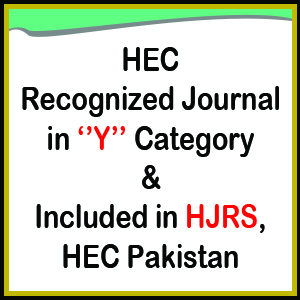The Impact of Post-Covid-19 Economic Recession on Public Perception of Climate Change and Environmental Behavior in Pakistan
DOI:
https://doi.org/10.47067/reads.v8i3.459Keywords:
Economic Recession, climate change, Covid-19, environmental economicsAbstract
The interconnection between economic development, fervid crossovers in the frame of contagious diseases, and environmental problems, in particular, have, until now, seen less scrutiny from environmental economists. Empirical evidence suggests that great economic recessions have proven to affect the prioritization of environmental and climate protection. The current study surveys the perception of the residents of Lahore, Pakistan regarding their environmental perception and awareness of climate change issues at the time of post-COVID-19 economic recession. Furthermore, the present study investigates several economic factors including the impact of economic recession influencing the environmental behavior of mainstream society. A cross-sectional quantitative research design was utilized to gather data from 343 respondents belonging to a public university in Pakistan. To statistically analyze the date, chi square test and multinomial logistic regression was utilized to examine significant economic factors associated with environmental behaviors. The findings reveal that climate change is viewed as one of the main ecological problems in Lahore, Pakistan. Furthermore, significant association was found between individual’s socioeconomic background and impact of economic recession with their prioritization of climate action. The present research has several implications as identifying rising challenges of economic and climate-related threats can aid in adopting a more dynamic approach to strategic and structural investments. The current paper suggests robust policy interventions against financial instability to ensure collective as well as individual effort against climate change for a stable and sustainable future.
References
Alam, M. M., Wei, H., & Wahid, A. N. (2021). COVID?19 outbreak and sectoral performance of the Australian stock market: An event study analysis. Australian economic papers, 60(3), 482-495.
Akerlof, K., Maibach, E. W., Fitzgerald, D., Cedeno, A. Y., & Neuman, A. (2013). Do people “personally experience” global warming, and if so how, and does it matter?. Global environmental change, 23(1), 81-91.
Barradas, J. I., & Ghilardi-Lopes, N. P. (2020). A case study using the New Ecological Paradigm scale to evaluate coastal and marine environmental perception in the Greater São Paulo (Brazil). Ocean & Coastal Management, 191, 105177.
Carolan, M. (2010). Sociological ambivalence and climate change. Local environment, 15(4), 309-321.
Claudio D. Rosa, Silvia Collado & Lincoln R. Larson (2022) The utility and limitations of the New Ecological Paradigm scale for children, The Journal of Environmental Education, DOI: 10.1080/00958964.2022.2044281
Derdowski, L.A.; Grahn, Å.H.; Hansen, H.; Skeiseid, H. The New Ecological Paradigm, Pro-Environmental Behaviour, and the Moderating Effects of Locus of Control and Self-Construal. Sustainability 2020, 12, 7728. https://doi.org/10.3390/su12187728
European Commission. (2008). Europeans’ Attitudes towards Climate Change, Special Eurobarometer 300/Wave 69.2; European Commission: Brussels, Belgium, 2008.
European Commission. (2013). Climate Change, Special Eurobarometer 409/Wave EB80.2; European Commission: Brussels, Belgium.
Lehdonvirta, V., Oksanen, A., Räsänen, P., & Blank, G. (2021). Social media, web, and panel surveys: using non?probability samples in social and policy research. Policy & internet, 13(1), 134-155.
Lo, A. Y. (2014). Negative income effect on perception of long-term environmental risk. Ecological Economics, 107, 51-58.
Lorenzoni, I., & Pidgeon, N. F. (2006). Public views on climate change: European and USA perspectives. Climatic change, 77(1), 73-95.
Matto Mildenberger & Anthony Leiserowitz (2017): Public opinion on climate change: Is there an economy–environment tradeoff?, Environmental Politics, DOI: 10.1080/09644016.2017.1322275
Mochizuki, Y., & Bryan, A. (2015). Climate change education in the context of education for sustainable development: Rationale and principles. Journal of Education for Sustainable Development, 9(1), 4-26.
Moeen, Muhammad Saad; Haider, Zeeshan; Shikoh, Sania Haider; Rizwan, Noormah; Davies, Stephen; and Rana, Abdul Wajid. 2020. COVID-19: Estimating impact on the economy and poverty in Pakistan: Using SAM Multiplier Model. PACE Policy Working Paper December 2020. Washington, DC: International Food Policy Research Institute (IFPRI).
Moeen, M. S., Haider, Z., Shikoh, S. H., Rizwan, N., Davies, S., & Rana, A. W. (2021). COVID-19: Estimating impact on the economy and poverty in Pakistan: Using SAM Multiplier Model. Intl Food Policy Res Inst.
Moeen, M. S., Haider, Z., Shikoh, S. H., Rizwan, N., Davies, S., & Rana, A. W. (2021). COVID-19: Estimating impact on the economy and poverty in Pakistan: Using SAM Multiplier Model. Intl Food Policy Res Inst.
Moser, S. C. (2009). Costly knowledge–unaffordable denial: The politics of public understanding and engagement on climate change. The Politics of Climate Change: A Survey, 1, 293-302.
Papoulis, D., Kaika, D., Bampatsou, C., & Zervas, E. (2015). Public perception of climate change in a period of economic crisis. Climate, 3(3), 715-726.
Pihkala, P. (2018). ECO?ANXIETY, TRAGEDY, AND HOPE: PSYCHOLOGICAL AND SPIRITUAL DIMENSIONS OF CLIMATE CHANGE: with Karl E. Peters,“Living with the Wicked Problem of Climate Change”; Paul H. Carr,“What Is Climate Change Doing to Us and for Us?”; James Clement van Pelt,“Climate Change in Context: Stress, Shock, and the Crucible of Livingkind”; Robert S. Pickart,“Climate Change at High Latitudes: An Illuminating Example”; Emily E. Austin,“Soil Carbon Transformations”; David A. Larrabee,“Climate Change and Conflicting Future .... Zygon®, 53(2), 545-569.
Shum, R. Y. (2012). Effects of economic recession and local weather on climate change attitudes. Climate Policy, 12(1), 38-49.
Skoufias, E., Rabassa, M., & Olivieri, S. (2011). The poverty impacts of climate change: a review of the evidence. World Bank Policy Research Working Paper, (5622).
Stratton, S. J. (2021). Population research: convenience sampling strategies. Prehospital and disaster Medicine, 36(4), 373-374.








